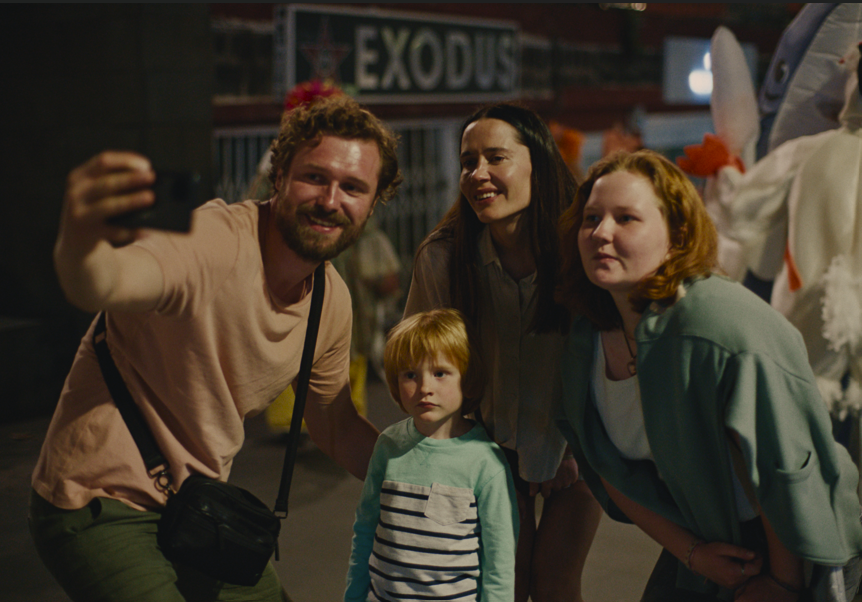
SIFF 2025: Day 6 Journal
May 20th, 2025 / Kevin Ward
Capsule Reviews of everything screened at the Seattle International Film Festival 2025
Under the Volcano
—❤️❤️❤️💔🖤 —
Under the Volcano follows Roman, Nastia, and their two children—teenage Sofia and younger Fedir—on what was meant to be a relaxing family vacation in Tenerife when Russia invades their homeland. With their return to Kyiv abruptly canceled, they're stuck in a limbo of sun-drenched beaches and rolling news alerts, surrounded by tourists for whom nothing seems out of the ordinary. While the world back home falls apart, they're expected to go on sipping cocktails and visiting scenic overlooks.
The dissonance between their internal panic and the idyllic surroundings surfaces in revealing ways. At one point, Nastia (Anastasiia Karpenko) lashes out at a group of Russian vacationers speaking loudly nearby, her fear and anger spilling over. At another, Roma (Roman Lutskyi) gets the family lost during a hike—a minor mishap that spirals into something heavier. His frustration builds into a quiet crisis of identity as he wonders whether he would've had the strength or courage to protect his family if they'd been back home instead of stranded in paradise.
The film subtly shifts its focus to teenage daughter Sofia (Sofia Berezovska) as she connects with a refugee grieving the loss of his best friend. Their tentative friendship echoes the family's struggle—lives paused, uncertain futures, perhaps haunted by survivors' guilt.
Damian Kocur's film may move at a deliberate pace and occasionally overplay its metaphors. Still, it's a resonant portrait of displacement, of what it means to watch your country unravel from a place where the sun still shines.
By Design
—❤️❤️🖤🖤🖤—
By Design hinges on an intriguing premise—Juliette Lewis plays Camille, a woman who swaps bodies with a chair and gradually realizes that people seem to prefer her that way. The film aims to explore the objectification of women, the desire for invisibility, and the societal urge to reduce women to their function or appearance. There’s rich territory here for absurdist satire or even horror. But the film’s execution is so muted and deadpan that it barely registers as either.
Rather than deepening its central metaphor, the story mostly just sits with it—much like Camille herself. The film turns to expressive lighting, interpretive dance, and vintage Gershwin cues to convey Camille’s inner world since she can’t speak while in chair form. But instead of drawing us closer to her experience, these choices often feel ornamental—more like conceptual flourishes than emotional breakthroughs. Usually a live wire, Juliette Lewis is almost entirely restrained, which may serve the concept but drains the film of vitality.
There’s clearly a voice here, and a point worth making. But By Design treats its own allegory with such still, suffocating seriousness that its message—about the silent, unseen suffering of being reduced to an object—ultimately ends up mirroring its form: inert.
Baby Doe
—❤️❤️❤️💔🖤 —
Baby Doe revisits the emotionally fraught 1996 case of Gail O’Rourke, a young woman charged with infanticide after leaving her newborn in the woods—a child she maintains was stillborn. The documentary carefully recounts the events, steering clear of sensationalism while probing the legal and societal machinery that swiftly turned against her.
Perhaps most telling is how male-dominated institutions—courts, prosecutors, media—struggled, or refused, to imagine Gail’s perspective. Again and again, we hear judges and lawyers ask what she could have possibly been thinking. But isn’t that the point? The proceedings were shaped by voices unable—or unwilling—to see the world through her experience, yet eager to moralize and condemn.
The film doesn’t answer every lingering question, nor does it try to. Instead, it reveals the deep empathy gaps in a system still largely run by men—especially when it comes to women’s bodies, autonomy, and trauma.


